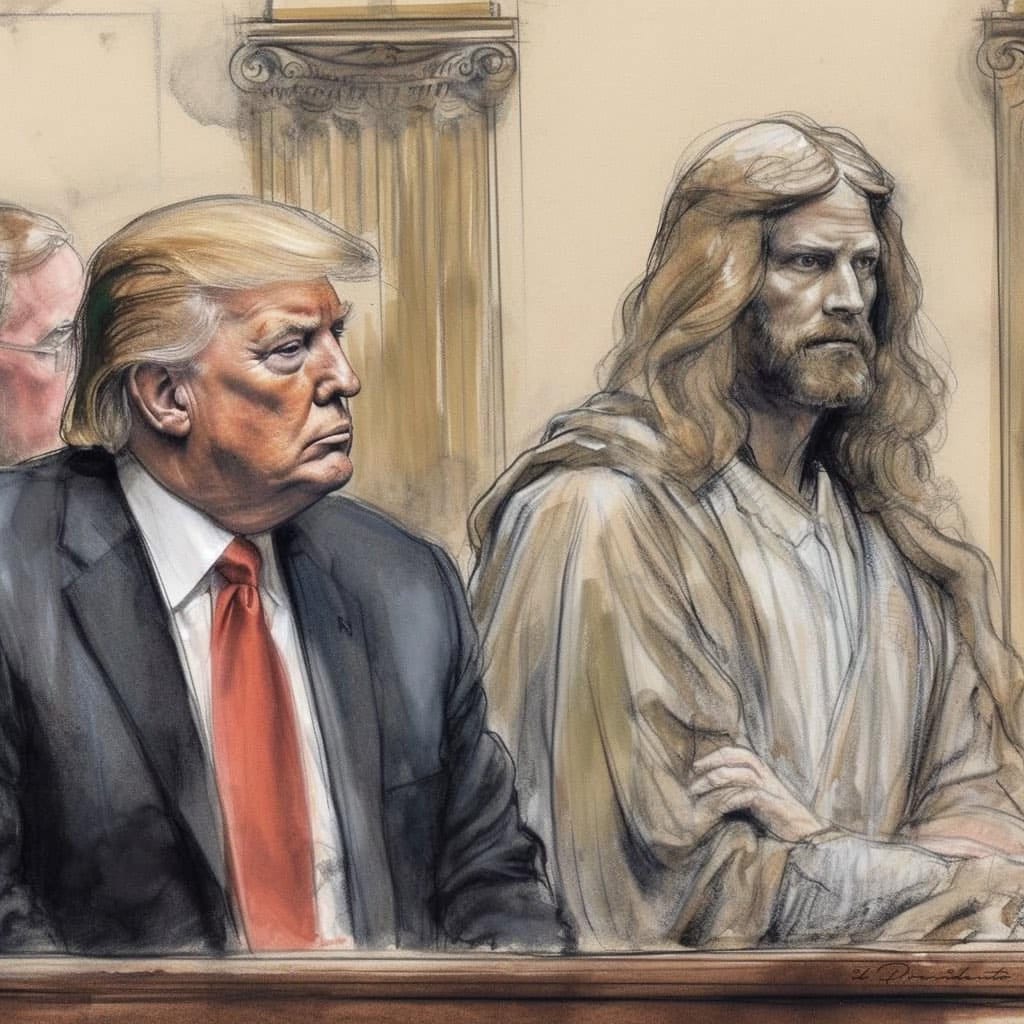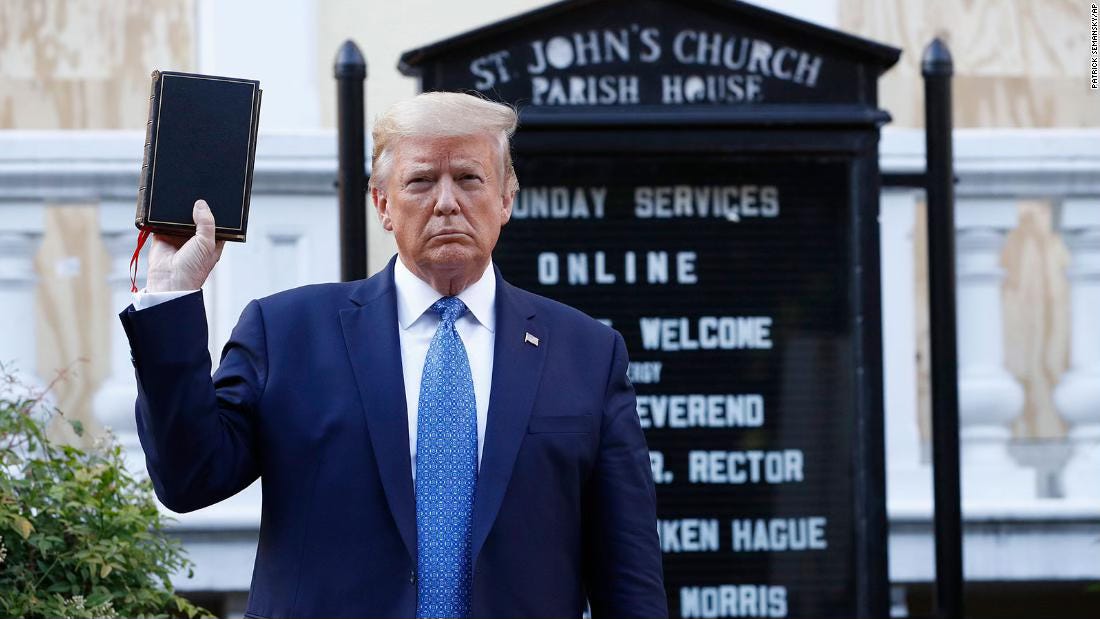An evangelical Christian, just not the religious kind
A look at the politicization of religious identities
This week Shadi Hamid posted some pretty fascinating survey results at the Washington Post on the political beliefs of evangelical Christians. It sparked some interesting debates about just what religious identity means today, and I wanted to take the opportunity to dive into what I think is a key subject for understanding modern Republicans.
Hamid cites a number of different studies showing shifts in religious identity. One striking one is that evangelism is the one branch of Christianity gaining adherents; every other one seems to be losing ground. But there’s an important wrinkle there — many of these new evangelical Christians aren’t regular churchgoers. Rather, they identify as evangelical Christians because of what it means politically, rather than religiously.
He also cites a study asking evangelical Christians if they agree with the statement “Jesus was a great teacher, but he was not God.” In 2020, 30% of evangelicals agreed with that; three years later, 43% agreed. As Hamid explains, this is not a matter of evangelicals rethinking Christ’s divinity. Rather, it’s about who calls themselves evangelical:
Evangelicalism, in short, has become about shared political convictions. In one survey of Christian attitudes, for example, 43 percent of evangelicals said they did not believe in the divinity of Christ. But it gets even more bizarre. According to the 2022 Cooperative Election Study, 14 percent of Muslims (and 12 percent of Hindus and 5 percent of Jews) described themselves as “born-again” or evangelical Christians. This is not a joke.
A new edited volume by Anand Sokhey and Paul Djupe — Trump, White Evangelical Christians, and American Politics — helps shed some light on this trend. We know the Republican Party has undergone some important changes in recent decades. These authors describe those changes as the result of a rise of “Christian nationalism”: the belief that America is lost and must be reclaimed by Christianity. This belief holds that, in Sokhey and Djupe’s phrasing, “The United States has been and should again be a Christian nation, sanctioned by God for Christians to work in the interests of Christians…. There is no daylight between church and state.”
As the authors note, Christian nationalism is an old movement, arguably predating the formation of the United States, but it has taken a strong foothold in US politics and especially within the GOP in recent years. The increased emphasis on limiting immigration, especially from Muslim-majority countries, can be seen as a manifestation of Christian nationalism. Trump, not known for his knowledge of or adherence to Scripture, nonetheless appealed overtly for the support of Christian nationalists during his runs for office. “The evangelicals love me,” boasted Trump in 2016 as he vowed “to protect Christians.” And notably, when Trump, as president, wanted to signal his disgust with the George Floyd protesters and the Black Lives Matter movement in the summer of 2020, he did so by tear-gassing a group of demonstrators in Lafayette Park and then hoisting a Bible in front of St. John’s Episcopal Church. Additionally, as Sokhey and Djupe demonstrate, it is the Christian nationalists who have most explicitly endorsed Trump’s more radical public actions. Those espousing Christian nationalist sentiments overwhelmingly describe the rioters of January 6, 2021, as “patriots.”
As loyal readers of this newsletter will note, I have argued that the important shift within the Republican Party over the past few decades has come from the rise of conservative populism. The Christian nationalism account and the conservative populism account are not necessarily opposites, and indeed both may be occurring simultaneously. I tend to see the populist story as one with greater explanatory power, however. The reason for this is that conservative populism was already guiding the Republican Party to a place largely consistent with Trump’s worldview before he even expressed interest in running for office. By contrast, Christian nationalism has some notable areas of conflict with Trump, and in nearly all of those, it has ceded the ground to Trump.
For example, a PRRI survey in 2011 found that only 30 percent of white evangelicals agreed with the statement that a person who commits an immoral act can behave ethically in public office. Five years later, in 2016, 72 percent of white evangelicals agreed with the statement. Opposition to an immoral person holding the presidency had been one of the most commonly stated rationales among evangelicals for impeaching Bill Clinton in 1999, but less than two decades later, immorality was not a dealbreaker in a president. Christianity didn’t undergo any major doctrinal shifts during this time; rather, evangelical Christian beliefs came face to face with Donald Trump, and the former blinked.
Again, a big part of this is who chooses to call themselves an evangelical Christian. But by contrast, conservative populism has not had to give ground to support Donald Trump; Christian nationalism has. The Christian nationalists arguably did well in the exchange; an increased role in governing institutions, the overturning of Roe v. Wade, and more. But in order to get that, it had to surrender one of its core tenets, that only moral people could provide moral leadership.
A final note on this is that I don’t believe this politicization of religious identity is unique to the right. As a few people have pointed out to me, there are plenty on the left who describe themselves as Buddhist, although they were neither raised in Buddhism nor much trained in its teachings. My impression is that this has much less political significance, however, and does not come with as many policy goals as the evangelical Christian label does.







Why my daughter told me she thinks God and country are one in the same to this group of Christians, it made sense to me. The way they have highjacked what it means to be a patriot or what our flag represents is especially sad for me as a veteran.
I think most Evangelicals are not the religious kind. Sure they go to church but the purpose is rile each other up and complain about the sinners. They also spend time talking about dinosaurs dining with early man and how bad evolution is. Then the pastor starts giving his sales pitch making everyone feel so guilty they sign over their unemployment check.
There’s also a short break where there’s some faith healing and just the right amount of fainting.
The guest speaker from another mega church whips people into a frenzy and they pass the collection plate so that poor guy can get himself a brand new car.
The congregation quiets down as people are invited to come up and be saved.. A few zombies come forth and everyone claps and there is a lot of sobbing.
It’s all promotional stunts and almost no mention of Jesus or his lessons from he New Testament. I don’t think Gd would count this church and the people inside Christians.